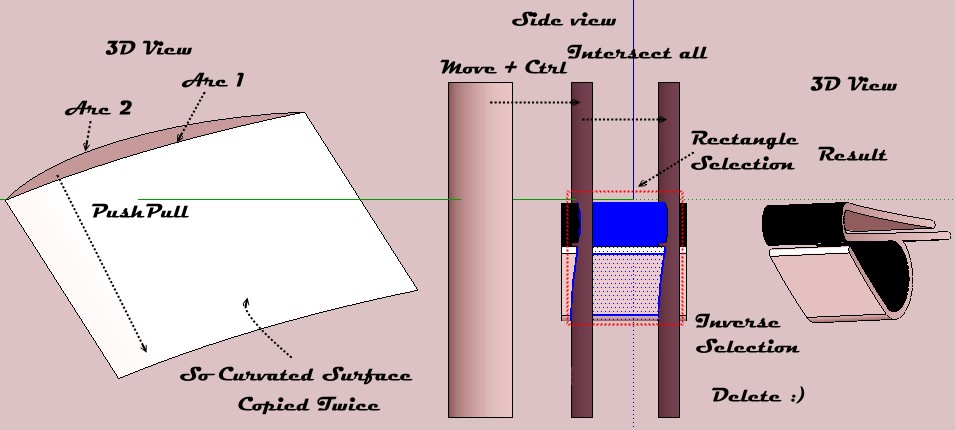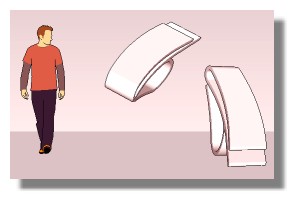Requesting help skewing a 3D object
-
That's a neat method, Jeff. I should do a video of mine and count the steps. I think mine might require fewer steps to get to the same end in this case. I can see some situations where your method could be faster, though.
-
Back again, just had a read thro all your comments and a play in SU. First up, a big THANK YOU to everyone - I finally get it (well, some of it some of the time, anyway).
Predictably, it turned out to be user error - thanks Dave for having the patience to step through the procedure, and jeff H for the video which rammed the point home. For the sake of other newbies like me, the error I was making was not intersecting the faces. So in Daves skp file (see upthread), I extruded the cutouts down past the model and assumed that this act alone created the intersection - it doesn't. You have to select everything, then right click - intersect faces (this puts the 2 elements, cutout and main model, into the same context, yes?) and NOW its easy (see Daves pics & Jeffs video). You have edges where you need them to delete the outside stuff you don't want. It takes seconds to clean it up. Jeffs method is kinda the inverse of this, and it also works really well. I've spent hours trying to do this, when in reality it should only take seconds - if you know how.
So now I know 4 seperate ways of doing this, 2 with inbuilt tools and 2 with plugins. I really appreciate everyone taking the time to offer help and advice.
I have a related question, prompted by some stuff upthread - if the mods think it better to make it a seperate thread, no problem.
Gilles said "When you proceed to deleting unwanted geometries, make the part soft and smooth", and Box mentioned welding the segments of the curves together. It got me thinking, because the ultimate aim is to print a real clip on a 3D printer (I'm new to that, too.....).
Now I know that SU draws circles as a series of straight lines, and I wanted the final 3D printed object to be circular not blocky, so I increased the segment count on the half circles to 100. Is this sensible, or just way too much? Gilles mentioned smoothing - does that just improve the visuals aspect of the image in SU, or does it have a real impact on a 3D printed object?
And Box mentioned welding the lines/segments of the curves together (presumably because the model was exploded at some stage in its history). I googled about this, and got rather confused. I understand that welding the lines together creates a polyline (polygonal curve), but I'm not clear how that actually differs from a regular line, and whether the arc/circle tools in SU create a series of regular lines or a polyline. And in the context of 3D printing, is it better that the curves be default SU arc/circles, or polylines?
Phew, another whole bunch of questions. I would like to finish with another, very sincere thanks for all the help you guys have given.
-
@Jazzyjeff
Wicked tut.
-
First, as to segment counts for arcs and circles, exactly how many you need will depend on a number of things. The actual size of the arc or circle and in the case of 3D printing, the resolution of the printer. You might get along fine with fewer. That'll be kind of a trial and error sort of thing.
As to welded versus unwelded curves, If you weld the segments of the curves, when you run Push/Pull the surface will be smoothed. You won't get all those parallel lines from the vertices as shown in your first screen shot. It also makes handling those entities easier because with a single click you can select the entire curve. I didn't weld the curve in the file I made. Instead I selected the geometry, context clicked and chose Smooth/Soften which softened the edges on the surface making the parallel lines disappear (they are still there, just not visible) but the edges are not welded. It would have made sense to weld the curves before you extruded with Push/Pull.
It isn't unusual when curves have many segments and small radii that they show up as exploded. I don't know why this is but it happens from time to time.
BTW, I'm glad you finally got it all worked out and you learned a bunch of stuff, too.
-
Natives type rather faster than me.
-
@unknownuser said:
Gilles said "When you proceed to deleting unwanted geometries, make the part soft and smooth", and Box mentioned welding the segments of the curves together. It got me thinking, because the ultimate aim is to print a real clip on a 3D printer (I'm new to that, too.....).
Smoothing allow you to to select a continuity of faces with one click (according to the smooth angle) when hidden geometry is off instead of one face.
if you extrude a face with welded edges instead of exploded edges, smooth will be automatic.@unknownuser said:
Now I know that SU draws circles as a series of straight lines, and I wanted the final 3D printed object to be circular not blocky, so I increased the segment count on the half circles to 100. Is this sensible, or just way too much? Gilles mentioned smoothing - does that just improve the visuals aspect of the image in SU, or does it have a real impact on a 3D printed object?
Smooth just improve the visuals aspect of the image in SU if you want to have a better 3D print render increase segmentation but don't forget 3D printing tolerance, so not that much segments.
@unknownuser said:
And Box mentioned welding the lines/segments of the curves together (presumably because the model was exploded at some stage in its history). I googled about this, and got rather confused. I understand that welding the lines together creates a polyline (polygonal curve), but I'm not clear how that actually differs from a regular line, and whether the arc/circle tools in SU create a series of regular lines or a polyline. And in the context of 3D printing, is it better that the curves be default SU arc/circles, or polylines?
this does not matter for 3D print, but make sure you part is a solid, must be a group or component in su to be a solid and a good orientation of the faces
-
Haha, I was typing like crazy then Submit to just find out two other almost exact answers have been submitted. At least I am glad it was the right answer !
Natives really type fast,though!!
Edited Duh moment for me, " Paste in place " - never used it ! I was just thinking, what is Jeff doing by deleting those !!
-
Fantastic - all my questions answered (well, until I encounter the next problem). Once again, and with feeling, thank you so much to all of you for taking a lot of time and effort to help me out (and apologies to Pilou and others for not uploading the v6 version of the model earlier).
-
@gilles said:
Natives type rather faster than me.
I only type with two fingers. Maybe I'll have to start typing with one eye tied behind my back.

-
Mostly because I was curious about the steps in the process I outlined, I made a video of it. I did it at almost the speed I'd work if I was doing it for myself and didn't need to say anything. I could have shortened it up. I think my computer was a bit overloaded when I recorded it because the first right to left selection didn't work correctly.
Although I use Edit>Paste in place a lot--so much so I have a keyboard shortcut for it--I'd never thought to use it in a case like this. I can see some good uses for it, though.
-
Another classic
-
-
The only thing I know in French would be Oui, Crepe Suzette and mon dieu!

-
Thx for the V6: that must be a reflex, a sort of esperento of file export between versions!

I will exam the videos tomorrow

@Dave : that will be funny to know where you found only these 3 words!

That can be a good resume of the Universe!
-

-
@dave r said:
Mostly because I was curious about the steps in the process I outlined, I made a video of it.
nice dave

pretty much anything which can show someone to avoid trying to manually delete a hundred or so edges with the eraser tool is the 'right' method
[EDIT]
good one pilou. i used to use that plugin (inverse selection) a lot... until v8 and the Solid Tools. (which is how i'd normally do this) -
Ok! Very cool videos Jeff and Dave!

But sorry for this time in this particular case...
I believe that I am more speedy and more simple!
You right I use plugin but just one and indispensable in the Toolbox!

The genious Inverse Selection by TIG! By Right Click
Only curvated face is duplicated not the volume!

Edit : I verify this morning because that was just theoric this night!

One of the curvated face must be "inverse white / blue" and the 2 curvated faces must be "Intersect with the model" ! And of course Rectangle Selection must be left to right!

Don't forget that in the past I have made "speedy challenge" Sketchup / Moi3D
"without plugin"
(of course I have losted at each time because Moi is unbeatable!
It's maybe for that I use now plugins! :
:If you are interested : Moi 22 seconds by PaQ!
 SU 40 seconds and playing as Horowitz!
SU 40 seconds and playing as Horowitz! 

Advertisement







